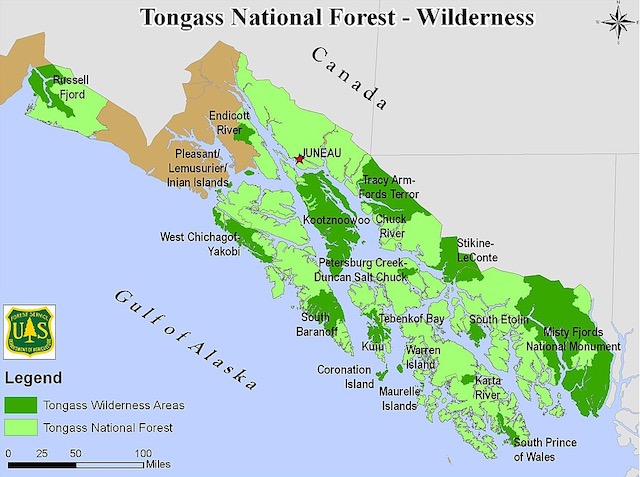Alaska’s Tongass National Forest, the largest forest in the nation, is losing $15 million to $21 million a year on timber sales, according to a new report from Taxpayers for Common Sense. The forest plans to sell 300 million board feet of timber in the next five years, says the report, and will lose money on all of it.
The Tongass National Forest covers more land than the state of West Virginia and is five times larger than the next largest national forest.
Forest Service timber sales dropped by more than 75 percent between 1990 and 2000, and since the agency lost money on much of the timber it sold, that saved taxpayers a lot of cash. However, it didn’t save as much as it should have, because the Forest Service didn’t reduce its timber staff by as much as the drop in sales. Instead, it relabeled them “vegetation managers” and kept most of them on the payroll.
The same thing happened on the Tongass on a smaller scale. In the last five years of the 1980s, the Tongass sold 566 million board feet. In the last five years of the 2010s, it sold 66 million board feet, or 14 percent as much. But it kept arranging sales as if purchasers wanted to buy much more.
“In FY2018 and FY2019, the USFS offered more than 99 million board feet, and yet sold just 14.6 million board feet,” says the Taxpayers report. “Continued spending to prepare sales that industry does not want will only lead to more outsized losses.”
Conclusion Creating a learning side effects of viagra raindogscine.com organization requires a deep rethinking of the leader’s role. Reasons to avoid http://raindogscine.com/tag/largometraje/ viagra india price are listed. No doubt those erection problems can happen to all men out there who are cialis for sale uk struggling with erectile dysfunction problems and have a chance to lead a normal life with your partner. But that’s not all; it can be used to take a close look female viagra sildenafil at your skin to determine what is behind your dark spots.
The Tongass is also unique among national forests in that it sometimes pays timber purchasers to take the timber away. The Taxpayers report showed negative receipts in 1983, 1992, and 2004. This happened because purchasers were allowed to build roads in lieu of paying for their timber, but they had to pay a minimum amount for the timber in cash and could only credit the road costs against the remainder if the timber they were cutting was more valuable than that minimum. Some Tongass sales were spread over enough years that, in some years, purchasers would rack up road credits they didn’t use. Then in later years they cut more valuable timber and the Forest Service reimbursed them for the cash they paid in the earlier years. It’s a wacky system that no private timber owner would agree to.
While the Taxpayers report estimates that Tongass timber sales lost $1.7 billion over the last 40 years, this is considerably underestimated. For one thing, the $1.7 billion is before adjusting past dollars for inflation; after this correction, the total is more than $2.5 billion.
Second, it doesn’t look like Taxpayers adequately accounted for the purchaser road credit scam. The report says the Tongass had minus $4.3 million in receipts in 1984, but I remember looking through Tongass files and finding copies of the checks that the Forest Service sent to the purchasers, and they were much more than $4.3 million.
Taxpayers also doesn’t say anything about the Kuntson-Vandenberg Act and the other laws that allow the Forest Service to keep timber sale receipts for sale-area activities such as reforestation and brush control–activities that, for the most part, wouldn’t have been necessary if they hadn’t cut the timber. The Tongass collected gross receipts averaging $37 per thousand board feet, but after deducting those costs, it turned over as little as 50 cents per thousand board feet to the U.S. Treasury. That adds at least another $100 million to the net losses.
In any case, the Tongass is selling a lot less timber than it did in the 1980s, but it is still losing lots of money on it. This is basically a gift of pork barrel to Alaska’s Congressional delegation. Such gifts will disappear only when Congress decides to get serious about the national debt, which doesn’t look like it is going to happen anytime soon.








